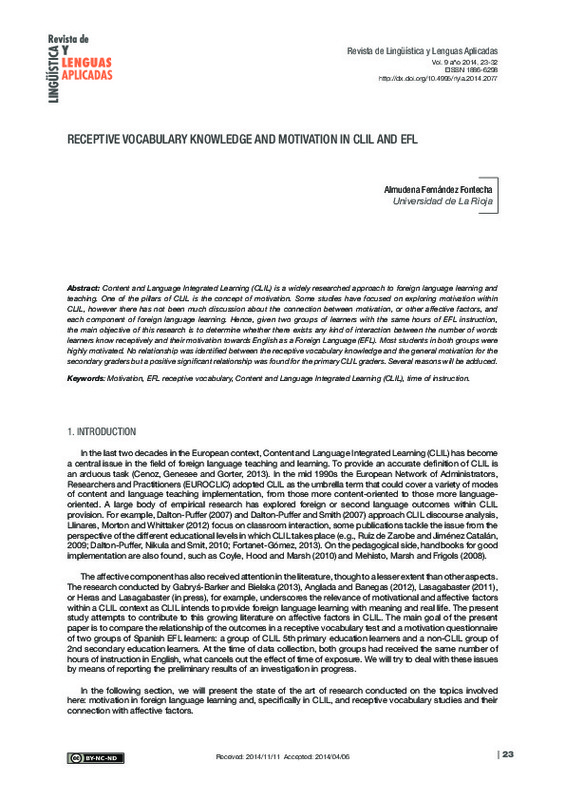Agustín Llach, M.P. and Terrazas Gallego, M. (2012). "Vocabulary Knowledge Development and Gender Differences in a Second Language", ELIA 12, 45-75.
Carreira, J.M. (2005). "New framework of Intrinsic/Extrinsic and Integrative/Instrumental Motivation in Second Language Acquisition", The Keiai Journal of International Studies 16, 39-64.
Carreira, J.M. (2006). "Motivation for learning English as a foreign language in Japanese elementary schools", JALT Journal 28, 135-157
[+]
Agustín Llach, M.P. and Terrazas Gallego, M. (2012). "Vocabulary Knowledge Development and Gender Differences in a Second Language", ELIA 12, 45-75.
Carreira, J.M. (2005). "New framework of Intrinsic/Extrinsic and Integrative/Instrumental Motivation in Second Language Acquisition", The Keiai Journal of International Studies 16, 39-64.
Carreira, J.M. (2006). "Motivation for learning English as a foreign language in Japanese elementary schools", JALT Journal 28, 135-157
Cenoz, J., Genesee, F. and D. Gorter (2013). "Critical analysis of CLIL: taking stock and looking forward", Applied Linguistics 13, 1-21.
Coyle, D., Hood, P., and Marsh, D. (2010). CLIL: Content and Language Integrated Learning. Cambridge: CUP.
Dalton-Puffer, C. and Smit, U. (eds.) (2007). Empirical Perspectives on CLIL Classroom Discourse. Frankfurt: Peter Lang.
Dörnyei, Z. (2005). The Psychology of the Language Learner: Individual Differences in Second Language Acquisition. Mahwah, NJ.: Lawrence Erlbaum.
Dörnyei, Z. (2009). "The L2 motivational self system", in Z. Dörnyei and E. Ushioda (eds.). Motivation, Language Identity and the L2 Self. Bristol: Multilingual Matters, 92-142.
Eccles, J.S., Wigfield, A. and Schiefele, U. (1998). "Motivation to succeed". W. Damon and N. Eisenberg (eds.) Handbook of Child Psychology, Vol. 3. New York, NY: John Wiley and Sons, 1017-1095.
Fortanet-Gómez, I. (2013). CLIL in Higher Education. Towards a Multilingual Language Policy. Bristol: Multilingual Matters.
Gabryś-Barker, D. and Bielska, J. (2013). The Affective Dimension in Second Language Acquisition. Bristol: Multilingual Matters.
Gardner, R.C. (1985). Social Psychology and Second Language Learning. London: Edward Arnold.
Jiménez Catalán, R.M. and Terrazas, M. (2005-2008). "The receptive vocabulary of English foreign language young learners", Journal of English Studies 5-6, 173-191.
Laufer, B. (1998). "The development of passive and active vocabulary in a second language: same or different?", Applied
Lepper, M., Sethi, S., Dialdin, D. and Drake, M. (1997). "Intrinsic and extrinsic motivation: A developmental perspective", in S.S. Luthar, J.A. Burack, D. Cicchetti and J.R. Weisz (eds.). Developmental Psychology: Perspectives on Adjustment, Risk, and Disorder. New York: Cambridge University Press, 23-50.
Llinares, A., Whittaker, R. and Morton, T. (2012). The Roles of Language in CLIL. Cambridge: CUP.
Masgoret, A-M. and Gardner R.C. (2003). "Attitudes, motivation, and second language learning: meta-analyses of studies by Gardner and associates", in Z. Dörnyei (ed.) Attitudes, Orientations and Motivations in Language Learning. Oxford: Blackwell, 167–210.
Mehisto, P., Marsh, D., Frigols, M.J. (2008). Uncovering CLIL: Content and Language Integrated Learning in Bilingual and Multilingual Education. Oxford: Macmillan.
Nation, P. (1983). "Teaching and testing vocabulary", Guidelines 5, 12-25.
Ruiz de Zarobe, Y. and Jiménez Catalán, R.M. (eds.) (2010). Content and Language Integrated Learning: Evidence from Research in Europe. Bristol: Multilingual Matters.
Schmidt, R. and Watanabe, Y. (2001). "Motivation, strategy use, and pedagogical preferences in foreign language learning", in Z. Dörnyei and R. Schmidt (eds.) Motivation and Second Language Acquisition (Technical Report #23). Honolulu: University of Hawai'i, Second Language Teaching and Curriculum Center, 313–359.
Schmitt, N. (2000). "Vocabulary acquisition", in N. Schmitt (ed.) Vocabulary in Language Teaching. Cambridge: Cambridge Language Education, 116-141.
Schmitt, N., Schmitt, D. and Clapham, C. (2001). "Developing and exploring the behaviour of two new versions of the Vocabulary Levels Test", Language Testing 18, 55–88.
[-]








